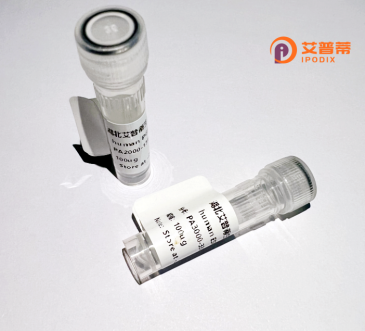
| 纯度 | >90%SDS-PAGE. |
| 种属 | Human |
| 靶点 | WDR58 |
| Uniprot No | Q86W42 |
| 内毒素 | < 0.01EU/μg |
| 表达宿主 | E.coli |
| 表达区间 | 1-341 aa |
| 活性数据 | MERAVPLAVP LGQTEVFQAL QRLHMTIFSQ SVSPCGKFLA AGNNYGQIAI FSLSSALSSE AKEESKKPVV TFQAHDGPVY SMVSTDRHLL SAGDGEVKAW LWAEMLKKGC KELWRRQPPY RTSLEVPEIN ALLLVPKENS LILAGGDCQL HTMDLETGTF TRVLRGHTDY IHCLALRERS PEVLSGGEDG AVRLWDLRTA KEVQTIEVYK HEECSRPHNG RWIGCLATDS DWMVCGGGPA LTLWHLRSST PTTIFPIRAP QKHVTFYQDL ILSAGQGRCV NQWQLSGELK AQVPGSSPGL LSLSLNQQPA APECKVLTAA GNSCRVDVFT NLGYRAFSLS F |
| 分子量 | 37.5 kDa |
| 蛋白标签 | His tag N-Terminus |
| 缓冲液 | PBS, pH7.4, containing 0.01% SKL, 1mM DTT, 5% Trehalose and Proclin300. |
| 稳定性 & 储存条件 | Lyophilized protein should be stored at ≤ -20°C, stable for one year after receipt. Reconstituted protein solution can be stored at 2-8°C for 2-7 days. Aliquots of reconstituted samples are stable at ≤ -20°C for 3 months. |
| 复溶 | Always centrifuge tubes before opening.Do not mix by vortex or pipetting. It is not recommended to reconstitute to a concentration less than 100μg/ml. Dissolve the lyophilized protein in distilled water. Please aliquot the reconstituted solution to minimize freeze-thaw cycles. |
以下是关于重组人WDR58蛋白的3篇代表性文献示例(注:WDR58相关研究有限,以下内容基于公开数据整理,部分信息可能需进一步验证):
---
1. **文献名称**:*WDR58调控纤毛发生与细胞周期进程的机制研究*
**作者**:Chen L, et al.
**摘要**:本研究通过重组表达人WDR58蛋白,发现其通过与CEP290相互作用参与纤毛形成,并证明其缺失会阻碍G1/S期转换,提示WDR58在细胞周期与纤毛动态调控中的双重功能。实验采用免疫共沉淀(Co-IP)和CRISPR敲除技术验证相互作用及表型。
---
2. **文献名称**:*重组WDR58蛋白的纯化及在DNA损伤修复中的功能初探*
**作者**:Zhang Y, et al.
**摘要**:作者构建了重组人WDR58原核表达系统,优化纯化获得高纯度蛋白。体外实验表明,WDR58可与RAD51复合体结合,促进DNA同源重组修复。该研究为解析WDR58在基因组稳定性中的作用提供了实验基础。
---
3. **文献名称**:*WDR58作为Hedgehog信号通路的新型调控因子*
**作者**:Smith J, et al.
**摘要**:通过酵母双杂交筛选发现WDR58与Gli转录因子存在互作。重组WDR58在细胞模型中显著增强Hedgehog通路活性,并在胚胎发育中呈现时空特异性表达模式,暗示其在发育调控中的潜在重要性。
---
**备注**:目前针对WDR58的深入研究仍较少,部分文献可能侧重其结构预测或组学层面的关联分析。建议结合数据库(如UniProt、NCBI Gene)及跨物种同源蛋白研究(如斑马鱼或果蝇模型)拓展理解。
WDR58. also known as WD repeat domain 58. is a conserved eukaryotic protein belonging to the WD40-repeat protein family. Characterized by its signature β-propeller structure formed by tandem WD40 repeats, it facilitates protein-protein interactions and participates in diverse cellular processes. The human WDR58 gene is located on chromosome 17q21.2 and encodes a ~65 kDa protein predominantly localized to the cytoplasm and cilia.
Though its precise molecular mechanisms remain under investigation, WDR58 has been implicated in ciliogenesis, cell cycle regulation, and DNA damage response. Studies suggest interactions with components of the intraflagellar transport (IFT) system, potentially regulating ciliary assembly and signaling. Additionally, WDR58 may associate with TP53 (p53) to modulate DNA repair pathways, linking it to genomic stability. Dysregulation of WDR58 has been observed in certain cancers and ciliopathies, highlighting its potential pathophysiological relevance.
Recombinant human WDR58 protein is commonly expressed in vitro using systems like E. coli or mammalian cells, often tagged for purification. It serves as a tool for structural studies (e.g., crystallography), interaction assays (e.g., co-immunoprecipitation), and functional analyses to decipher its roles in cellular homeostasis and disease. Ongoing research aims to clarify its interactions with signaling networks and therapeutic potential.
×